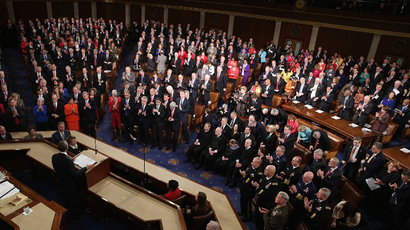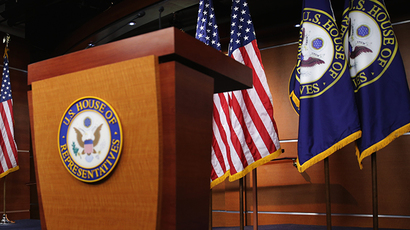Moscow: Neither current nor future sanctions against Russia will help Washington

The US remains a victim of misconceptions and misguided ideas regarding what happened in Ukraine, and no sanctions – whether they are already imposed or new – will produce Washington's desired result, Russian Deputy Foreign Minister Sergey Ryabkov said.
In his interview with ITAR-TASS news agency, Ryabkov called the US restrictive measures against Russia an instrument of the past, belonging to the 19th century.
The sanctions became Washington’s response to last month's accession of Crimea to Russia. They include travel bans and foreign asset freezes imposed on Russian politicians and businessmen as well as the severing of cooperation with Russia in many spheres, from trade talks to space exploration.
Question:Could you please comment on US sanctions against Russia? How will they affect bilateral and multilateral cooperation?
Sergey Ryabkov: The US president has recently signed a bill codifying sanctions against Russia. Once again, we see that the US administration remains victim of its misconceptions and misguided ideas regarding what happened in Ukraine and in Crimea and regarding ways to resolve the Ukrainian crisis.
It’s obvious that no sanctions, neither those already imposed nor the ones that may be imposed later under this new law, can or will produce the result Washington hopes for. To begin with, unilateral exterritorial sanctions are an illegitimate instrument; international law does not recognize them as a legitimate instrument of influence. We believe such instruments belong to the past.
Washington likes to talk about Russia being “on the wrong side of history” and keeps saying, as a mantra, that Russia is in some sort of isolation, but in reality it is Washington who can’t stop using methods and ways that belong to the 19th century.
It is alarming that our US counterparts, veiled by the phraseology approved at the very top in Washington, are unable to see unchangeable reality and seek to impose their stillborn and basically disastrous approaches on other members of the international community. The reality is that, with a vast majority of the vote, the Crimean people have made an irrevocable decision to reunify with Russia.
The officials of the US administration have recently gone public many times to explain why they are not happy with Russia’s actions. However, there’s little rationale behind their statements, let alone common sense. For instance, they have lambasted Russia for using 'non-market leverage' when it offered a new price for natural gas supplies to its Ukraine prices. At the same time they are ruthlessly pressurizing the EU into investing billions of euros into upgrading Ukraine’s oil and gas infrastructure, masking the move as 'easing energy dependency on Moscow.' Do their actions fall in line with market economy principles?

Is it the free play of market forces when credit rating agencies downgrade their outlook for Russia’s corporate entities making the cost of borrowing more expensive?
But here’s what surprises me most. After the US had introduced a new round of visa bans against Russian officials, we made a reciprocal move and published part of our own blacklist, keeping the other part undisclosed. We got an immediate response from Washington saying that our decision was unlawful. It appears that unlike Moscow’s steps, all Washington’s decisions are lawful.
There’s no point in further comments regarding these ‘peculiar features’ of US policies. I am sure there’ll be plenty of stories like that in the future.
There’s one point I would like to add. It’s not only Russia but other countries that have taken note of Washington’s recent excesses. There are conclusions to be made for policy-makers and diplomats. But the level of confidence to the US in the world has definitely changed from stable to negative.
Q:How would you account for Washington’s recent decision to suspend its cooperation with Russia in the area of civilian nuclear technology?
SR: We are currently trying to figure out what the US Energy Ministry’s statement on suspending cooperation should mean in practice. We have some very impressive prospects and a few large-scale joint projects with the US in the area of civilian nuclear power. Moreover, this is an area of cooperation where benefit has always been mutual.
It looks outright weird: first our American counterparts spend years telling us how important this kind of cooperation is for the future of global power production, for science and for the environment, and then, next thing you know, we are being told that practical cooperation over those groundbreaking projects is no longer possible. That is immature, improper, and plain wrong.
We still hope that, once the wind shifts in Washington and emotions start to cool down, the Americans will be able to realize they’ve been missing the forest for the trees.
Q:Has the preparation for the G8 summit been put on hold, or is Sochi still ready to host the event?
SR: We have indeed suspended the preparation of the G8 summit in Sochi. But that wasn’t our idea. It’s the US and other group members that withdrew from the Russian presidency. It’s obvious that if the main event of the G8 calendar for 2014 fails to take place, we don’t really see much point in holding the rest of the events, though the comprehensive and diverse agenda of the Russian presidency won approval of the G8 leaders at the turn of the year.
We will, however, still hold the events that are supposed to engage not only the G8 but also other countries and international organizations. But if attempts to manipulate our presidency status and to push through an alternative vision for conferences and meetings should continue, we will refuse to show up at such events.
It is regrettable that some governments toed Washington’s line, so to speak, dealing a major blow to this time-tested and quite effective platform for cooperation on many key political and economic issues. But the current situation also has certain benefits, one of them being faster movement towards a multipolar world, where solutions are worked out on the basis of a genuine balance of interests rather than a system of dominance and subordination.














